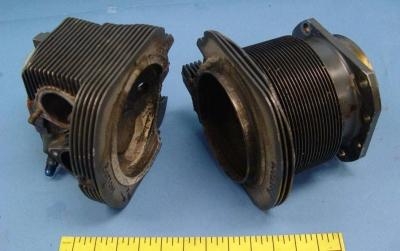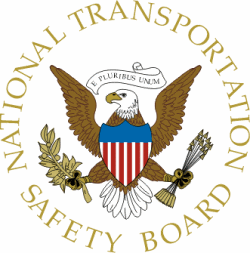Cylinder Assemblies Failed Due To Fatigue Cracking
In a letter to acting FAA Administrator Michael Huerta, the NTSB
has recommended that the agency require repetitive inspection of
Engine Components, Inc. cylinder assemblies produced between May
2003 and October 2009 (serial numbers 7709 through 52884) installed
on Teledyne Continental Motors model 520 and 550 engines and
removal of these cylinder assemblies once they reach the engine
manufacturer’s recommended normal time (hours) in service
between overhauls.
NTSB Image

In its letter, the NTSB says that since 2000, "the ...Board has
examined numerous Engine Components, Inc. (ECi) reciprocating
engine cylinder assemblies that failed due to fatigue cracking that
initiated in the root of the cylinder head thread, eventually
resulting in loss of compression and/or separation of the cylinder
head into two pieces. These failures involved new assemblies
installed on Lycoming and Teledyne Continental Motors (TCM)2
engines, and many resulted in fatal accidents.
"Although the FAA has issued several airworthiness directives
(AD) applicable to certain new ECi cylinder assemblies used on
Lycoming and TCM engines to address this issue, similar fatigue
failures in other new ECi cylinder assemblies installed on TCM
engines have been identified but are not covered by an existing AD.
Because fatigue cracking and separation of cylinder assemblies in
piston-engine aircraft is a serious safety issue, this letter
recommends corrective action for certain new ECi cylinders used on
TCM engines."

NTSB and FAA representatives formed a task force in 2005 to
study fatigue failures of cylinder heads, which at that point
included domestic and foreign failures. In 2006, the task force
visited several facilities, including ECi, and observed the entire
manufacturing process, from casting of the cylinder heads to
cylinder assembly. The NTSB continued examining failed cylinders
and updating the FAA’s aircraft certification office
responsible for oversight of ECi. Following a meeting of NTSB, FAA,
and ECi representatives in October 2006 to discuss the cylinder
head fatigue failure issue, ECi designed and manufactured a fatigue
test fixture that simulates the cylinder head temperature and
pressure cycles experienced by a cylinder on an operating engine.
After running numerous tests, ECi changed the manufacturing process
for its cylinder assemblies in October 2009 to provide an increased
interference fit at the shrink band and between the cylinder head
and the cylinder barrel threads but remaining within the limits of
the approved design.
During a meeting in January 2011 between ECi, the FAA, and the
NTSB, ECi produced data on the cylinder assembly failures and
recommended that the FAA issue an AD to mandate inspection and
replacement of any discrepant cylinders; however, the FAA has not
taken the recommended action for those cylinders not currently
covered by an AD. Since the design improvement in October 2009,
there have been no reported cylinder head fatigue failures on ECi
cylinder assemblies installed on TCM model 520 and 550 engines.
Although ECi’s changes to the manufacturing process may
increase the fatigue strength of new production cylinder heads, a
large population of potentially discrepant cylinder assemblies
remains in service without any required corrective action.
The FAA has not yet commented on the safety recommendations.
 ANN's Daily Aero-Term (05.05.25): Circle To Runway (Runway Number)
ANN's Daily Aero-Term (05.05.25): Circle To Runway (Runway Number) ANN's Daily Aero-Linx (05.05.25)
ANN's Daily Aero-Linx (05.05.25) NTSB Prelim: De Havilland DHC-1
NTSB Prelim: De Havilland DHC-1 Classic Aero-TV: The Boeing Dreamliner -- Historic First Flight Coverage
Classic Aero-TV: The Boeing Dreamliner -- Historic First Flight Coverage Airborne-NextGen 05.06.25: AF Uncrewed Fighters, Drones v Planes, Joby Crew Test
Airborne-NextGen 05.06.25: AF Uncrewed Fighters, Drones v Planes, Joby Crew Test




